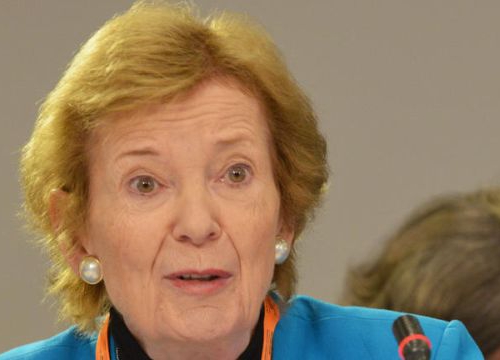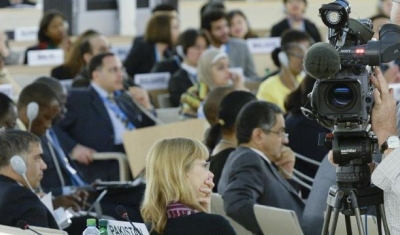Mary Robinson Refers to our Research on Human Rights and the SDGs at Human Rights Council Meeting on the 2030 Agenda


Scaling Up Nutrition
17 January 2019
Our publication No One will be Left Behind and its recommendations have been widely cited in Mary Robinson 's speech at the United Nations (UN) Human Rights Council inter-sessional meeting on human rights and the 2030 Agenda for Sustainable Development.
‘I am grateful to Dr Christophe Golay and the Geneva Academy for updating me on the extent of these important recommendations. I agree with the Geneva Academy and with other experts who point out that the main weakness of the 2030 Agenda lies in its accountability framework, based on national review and peer-reviewed guidance’ mentioned Mary Robinson, a former UN High Commissioner for Human Rights, Chair of The Elders and President of the Mary Robinson Foundation.
Mary Robinson also presented our publication’s main recommendation, which is that ‘the UN human rights mechanisms should see this weakness as a call for action, and take further steps to share the results of their work with monitoring mechanisms established by the 2030 Agenda, and by including in their work insights of the monitoring of the SDGs’.
About the Publication
No One will be Left Behind looks at the role of UN human rights mechanisms in monitoring the Sustainable Development Goals (SDGs) that seek to realize economic, social and cultural rights (ESCR).
It discusses the mutually reinforcing relationship between the SDGs and ESCR. ESCR can offer a legal foundation and guidance in the implementation of SDGs, and the SDGs may increase support for the realization of ESCR.
The publication highlights that the weakness of the 2030 Agenda lies in its limited accountability framework, based on voluntary national reviews and soft guidance from peers. In that context, UN human rights mechanisms – UN treaty bodies, the UN Human Rights Council and its Universal Periodical Review and Special Procedures – can give the SDGs a strong legal basis and provide a means of accountability via independent mechanisms. They can transform the SDGs’ beneficiaries into rights-holders, and the UN Members States as those having legal obligations to implement the 17 goals. The international human rights system can provide guidance to states in the implementation of the SDGs, as well as to national, regional and international mechanisms established in the framework of the 2030 Agenda, notably the High-level Political Forum on Sustainable Development (HLPF).
The publication also draws attention to the need to fully integrate human rights into the implementation and monitoring of the SDGs, while also providing a set of concrete recommendations for states, UN human rights mechanisms, the Office of the UN High Commissioner for Human Rights and the HLPF as to how this might be done.
The Research Brief Economic, Social and Cultural Rights and the Sustainable Development Goals provides a summary of this publication.








